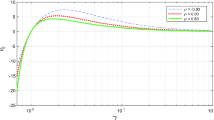Abstract
This paper investigates how a linear contract offered to a portfolio manager affects her incentives to acquire precise information. I show that increasing the manager's portfolio share increases her demand for precise information. This result contrasts with the existing irrelevance results where the manager's portfolio share does not affect her precision choice. The irrelevance result relies on the manager facing a constant asset price, regardless of her demand. In a noisy rational expectations framework, increasing the manager's share decreases her demand and results in a less informative asset price. Thus, the manager gathers more precise information when offered a larger fraction of portfolio returns.
Similar content being viewed by others
References
Admati, A., and P. Pfleiderer. “Does It All Add Up? Benchmarks and Compensation of Active Portfolio Managers.” Journal of Business 70 (1997), 323–350.
Allen, F., and G. Gorton. “Churning Bubbles.” Review of Economic Studies 60 (1993), 813–836.
Biais, B., and L. Germain. “Incentive Compatible Contracts for the Sale of Information.” The Review of Financial Studies 15 (2002), 987–1003.
Carpenter, J. “Does Option Compensation Increase Managerial Risk Appetite.” Journal of Finance 55 (2000), 2311–2331.
Das, S. R., and R. Sundaram. “Fee Speech: Signalling, Risk Sharing, and The Impact of Fee Structures on Investor Welfare.” The Review of Financial Studies 15 (2002), 1465–1497.
Davanzo, L., and S. Nesbit. “Performance Fees for Investment Management.” Financial Analyst Journal January (1987), 14–20.
Goldman, E., and S. Slezak. “Delegated Portfolio Management and Rational Prolonged Mispricing.” Journal of Finance 58 (2003), 283–311.
Golec, J. “Empirical Tests of a Principal/Agent Model of the Investor/Investment Advisor Relationship.” Journal of Financial and Quantitative Analysis 27 (1992), 81–95.
Grinblatt, M., and S. Titman. “Adverse Risk Incentives and Design of Performance Based Contracts.” Management Science 35 (1989), 807–822.
Grinold, R., and A. Rudd. “Incentive Fees: Who Wins? Who Loses?” Financial Analyst Journal, January (1987), 27–38.
Huberman, G., and S. Kandel. “On the Incentives for Money Managers: A Signalling Approach.” European Economic Review 37 (1993), 1065–1081.
Hogg, R., and A. Craig. Introduction to Mathematical Statistics, Fourth Edition. Macmillan Publishing: New York, 1978.
Lakonishok, J. A., A. Schleifer, and R. Vishny. “The Structure and Performance of the Money Management Industry.” Brookings Papers: Microeconomics (1992), 339–391.
Stoughton, N. “Moral Hazard and the Portfolio Management Problem.” Journal of Finance 48 (1993), 2009–2028.
Wilson, R. B. “Theory of Syndicates.” Econometrica 36 (1968), 119–132.
Author information
Authors and Affiliations
Rights and permissions
About this article
Cite this article
Ozerturk, S. Equilibrium Incentives to Acquire Precise Information in Delegated Portfolio Management. Journal of Financial Services Research 25, 25–36 (2004). https://doi.org/10.1023/B:FINA.0000008663.41246.2c
Issue Date:
DOI: https://doi.org/10.1023/B:FINA.0000008663.41246.2c




